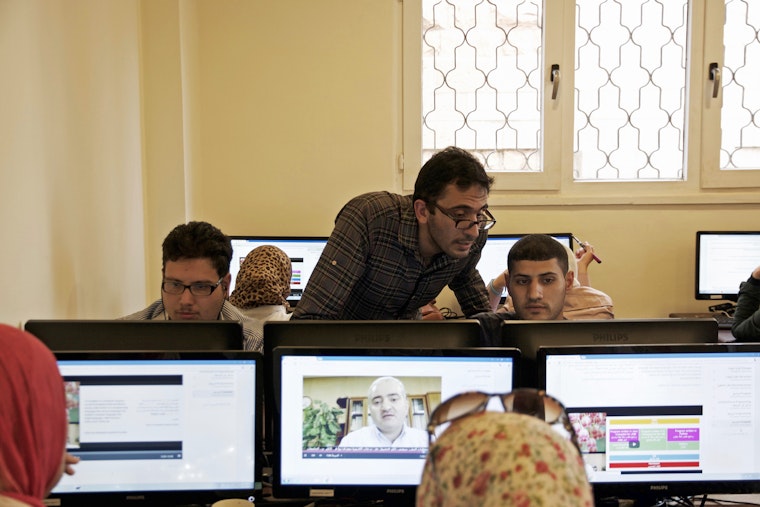Q&A: A New Way to Access Higher Education for—and by—Displaced Syrians

The Jamiya Project was established in 2016 with a focus on overcoming the barriers that refugees face in accessing higher education. Jamiya blends online and in-person university courses for Syrians in Jordan, and aims to create a replicable blueprint that can be deployed in future refugee crises. Founder and director Ben Webster talked to us about Jamiya’s distinctive approach to providing education during displacement.
How has the war in Syria impacted access to higher education?
Before the civil war, a quarter of Syrians went on to training or higher education. Five years later, the conflict has put a serious dent in education access for Syrians in the country and those who have been displaced, threatening to create an entire generation without higher education.
A recent EU report estimated there are 90,000 Syrians in the Middle East who could potentially attend university but cannot, due to barriers of language, cost, work and family obligations, missing documentation, and a lack of capacity at universities in the region.
Yet we see that for many Syrians, significant expectations and demand for education remain. The current higher education structures and traditional development and humanitarian aid models are struggling to cope with this scale and complexity of need.
What can be done to support Syrians seeking higher education amid disruption and displacement?
We need innovative approaches to reconnect Syrian students with higher education now, as well as meet the needs of others to come. Digital education provides the flexibility vital to balancing schooling with the social and work pressures our students face in their present circumstances. At Jamiya, we use a “blended” approach, supplementing online education with face-to-face tuition and local learning centers for an interactive, project-based experience.
We are currently offering pilot courses for refugees in Amman and Za’atari camp in Jordan, facilitated at Norwegian Refugee Council and Jesuit Refugee Service centers, and using an applied IT and global studies curriculum developed by Syrian academics in exile alongside the University of Gothenburg in Sweden. Already at this stage of trialing our approach, we have found that this blended education model has opened up opportunities where none existed before.
How are you involving a network of Syrian academics?
The Syrian higher education network has not disappeared; it has been dispersed, displaced, and disconnected. There are several thousand Syrian academics who have fled the conflict and are now based in the region or elsewhere in the world. Using online platforms helps us to unlock the capacity, knowledge, and skills of this community of academics, keeping the diaspora engaged in enabling the continuity of education during a period of uncertainty.
Does the Jamiya Project’s support for Syrian refugee students go beyond schooling?
From speaking with students in our course and other Syrian refugees in Amman and Za’atari camp, we have learned a great deal about underestimated obstacles that prevent refugees from accessing higher education, and the various factors that motivate or discourage them.
One thing we’ve found is that Syrian refugee students really benefit from informal support outside of the classroom, including being connected to a wider community. This led us to match Jamiya students with mentors from across the world to help encourage students to continue their studies despite other serious strains, such as exhaustion from long workdays, and personal doubts or disheartenment.
Why is access to higher education so crucial for this group?
When asked what university means to them, Jamiya’s students have answered that it is “the first step to a better future.” In the short-term, providing Syrian students with learning and qualifications will help open the door to employment and further study. And we also hope that once Syria stabilizes, a young generation of skilled, knowledgeable leaders can actively participate in the country’s reconstruction.
While they may return to a Syria where thousands of school buildings have either been bombed or commandeered for military use, their role within a resilient higher education network can help rebuild peace and prosperity in the region.
The Jamiya Project is a grantee of the Open Society Foundations.